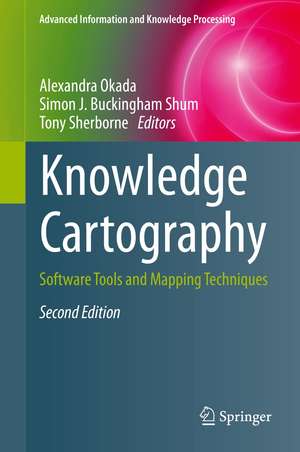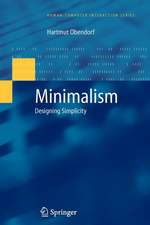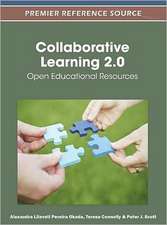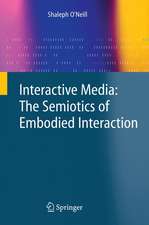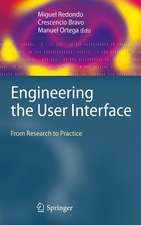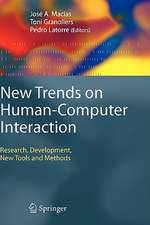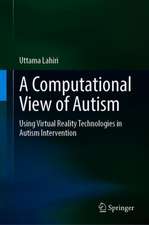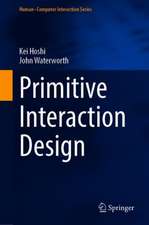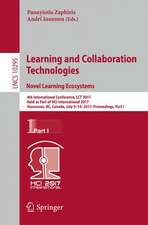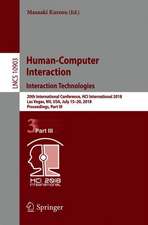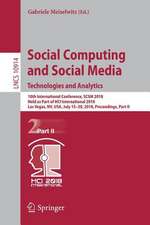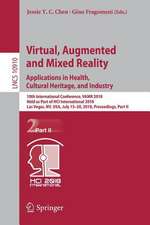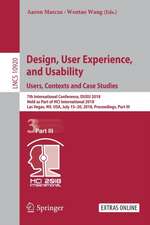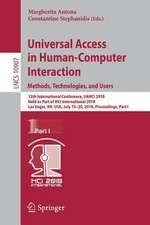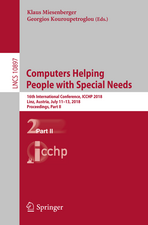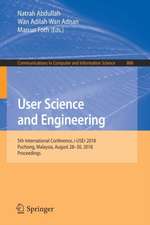Knowledge Cartography: Software Tools and Mapping Techniques: Advanced Information and Knowledge Processing
Editat de Alexandra Okada, Simon J. Buckingham Shum, Tony Sherborneen Limba Engleză Hardback – 27 oct 2014
| Toate formatele și edițiile | Preț | Express |
|---|---|---|
| Paperback (1) | 617.67 lei 38-44 zile | |
| SPRINGER LONDON – 27 sep 2016 | 617.67 lei 38-44 zile | |
| Hardback (1) | 665.61 lei 6-8 săpt. | |
| SPRINGER LONDON – 27 oct 2014 | 665.61 lei 6-8 săpt. |
Din seria Advanced Information and Knowledge Processing
- 20%
 Preț: 330.44 lei
Preț: 330.44 lei - 20%
 Preț: 53.43 lei
Preț: 53.43 lei - 20%
 Preț: 1042.28 lei
Preț: 1042.28 lei - 18%
 Preț: 726.85 lei
Preț: 726.85 lei - 20%
 Preț: 646.30 lei
Preț: 646.30 lei - 20%
 Preț: 990.80 lei
Preț: 990.80 lei - 20%
 Preț: 647.61 lei
Preț: 647.61 lei - 20%
 Preț: 996.56 lei
Preț: 996.56 lei - 20%
 Preț: 994.40 lei
Preț: 994.40 lei - 20%
 Preț: 985.03 lei
Preț: 985.03 lei - 20%
 Preț: 654.37 lei
Preț: 654.37 lei - 20%
 Preț: 989.79 lei
Preț: 989.79 lei - 20%
 Preț: 991.27 lei
Preț: 991.27 lei - 15%
 Preț: 645.79 lei
Preț: 645.79 lei - 20%
 Preț: 817.55 lei
Preț: 817.55 lei - 20%
 Preț: 991.46 lei
Preț: 991.46 lei - 18%
 Preț: 1114.83 lei
Preț: 1114.83 lei - 20%
 Preț: 589.93 lei
Preț: 589.93 lei - 20%
 Preț: 995.75 lei
Preț: 995.75 lei -
 Preț: 454.92 lei
Preț: 454.92 lei - 20%
 Preț: 992.62 lei
Preț: 992.62 lei - 20%
 Preț: 645.14 lei
Preț: 645.14 lei - 20%
 Preț: 647.61 lei
Preț: 647.61 lei - 20%
 Preț: 638.69 lei
Preț: 638.69 lei - 18%
 Preț: 955.08 lei
Preț: 955.08 lei - 20%
 Preț: 643.97 lei
Preț: 643.97 lei - 20%
 Preț: 983.02 lei
Preț: 983.02 lei - 20%
 Preț: 645.31 lei
Preț: 645.31 lei - 18%
 Preț: 950.96 lei
Preț: 950.96 lei - 20%
 Preț: 921.17 lei
Preț: 921.17 lei - 20%
 Preț: 653.71 lei
Preț: 653.71 lei - 20%
 Preț: 988.00 lei
Preț: 988.00 lei - 18%
 Preț: 947.67 lei
Preț: 947.67 lei - 20%
 Preț: 1004.99 lei
Preț: 1004.99 lei - 20%
 Preț: 650.92 lei
Preț: 650.92 lei - 20%
 Preț: 998.21 lei
Preț: 998.21 lei - 20%
 Preț: 642.65 lei
Preț: 642.65 lei - 20%
 Preț: 988.00 lei
Preț: 988.00 lei - 20%
 Preț: 997.38 lei
Preț: 997.38 lei - 20%
 Preț: 650.59 lei
Preț: 650.59 lei - 20%
 Preț: 647.61 lei
Preț: 647.61 lei
Preț: 665.61 lei
Preț vechi: 832.01 lei
-20% Nou
Puncte Express: 998
Preț estimativ în valută:
127.40€ • 138.44$ • 107.09£
127.40€ • 138.44$ • 107.09£
Carte tipărită la comandă
Livrare economică 21 aprilie-05 mai
Preluare comenzi: 021 569.72.76
Specificații
ISBN-13: 9781447164692
ISBN-10: 1447164695
Pagini: 540
Ilustrații: XXV, 540 p. 232 illus., 171 illus. in color.
Dimensiuni: 155 x 235 x 27 mm
Greutate: 0.97 kg
Ediția:2nd ed. 2014
Editura: SPRINGER LONDON
Colecția Springer
Seria Advanced Information and Knowledge Processing
Locul publicării:London, United Kingdom
ISBN-10: 1447164695
Pagini: 540
Ilustrații: XXV, 540 p. 232 illus., 171 illus. in color.
Dimensiuni: 155 x 235 x 27 mm
Greutate: 0.97 kg
Ediția:2nd ed. 2014
Editura: SPRINGER LONDON
Colecția Springer
Seria Advanced Information and Knowledge Processing
Locul publicării:London, United Kingdom
Public țintă
ResearchCuprins
Preface. - Contributors. - Empirical Studies of the Value of Conceptually Explicit Notations in Collaborative Learning. - Concept Mapping Using CmapTools to Enhance Meaningful Learning. - Enhancing Collaborative and Meaningful Language Learning Through Concept Mapping. -Thinking Maps®: a Visual Language for Learning. - The Constructivist Mapping of Internet Information at Work with Nestor. - Cognitive and Pedagogical benefits of Argument Mapping: L.A.M.P. Guides the Way to Better Thinking. -Scaffolding School Students’ Scientific Argumentation in Inquiry-based Learning with Evidence-Based Dialogue Maps. - Argument Diagramming: The Araucaria Project - Mapping the Curriculum: How Concept Maps can Improve the Effectiveness of Course Development. - Using Compendium as a Tool to Support the Design of Learning Activities. - Performing Knowledge Art: Understanding Collaborative Cartography. - The Map and the Territory – a Practitioner Perspective on Knowledge Cartography. -Knowledge Cartography for Controversies: The Iraq Debate. - Visualized Problem Structuring for Stakeholder Consultations. - Enhancing Discussion Forums with Combined Argument and Social Network Analytics. - Computer Supported Argument Visualisation: Modelling in Consultative Democracy around Wicked Problems. - Human-Agent Knowledge Cartography for e-Science: NASA Field Trials at the Mars Desert Research Station. - Integrating Argument Mapping with Systems Thinking Tools. – Advancing Applied Systems Science. - Visualizing Knowledge Along Semantic and Geographic Dimensions. A Web Intelligence Platform to Explore Climate Change Coverage. - Template-Based Structured Argumentation. - An Experience of the Use of the Cognitive Mapping Method in Qualitative Research. - Collaborative Knowledge Modelling with a Graphical Knowledge Representation Tool MOT: A Strategy to Support the Transfer of Expertise in Organizations. - Author Biographies. - Index.
Textul de pe ultima copertă
Focuses on the process by which manually crafting interactive, hypertextual maps clarifies one’s own understanding, communicates it to others, and enables collective intelligence.
The authors see mapping software as visual tools for reading and writing in a networked age. In an information ocean, the challenge is to find meaningful patterns around which we can weave plausible narratives. Maps of concepts, discussions and arguments make the connections between ideas tangible - and critically, disputable.
With 22 chapters from leading researchers and practitioners (5 of them new for this edition), the reader will find the current state-of-the-art in the field. Part 1 focuses on knowledge maps for learning and teaching in schools and universities, before Part 2 turns to knowledge maps for information analysis and knowledge management in professional communities, but with many cross-cutting themes:
· reflective practitioners documenting the most effective ways to map
· conceptual frameworks for evaluating representations
· real world case studies showing added value for professionals
· more experimental case studies from research and education
· visual languages, many of which work on both paper and with software
· knowledge cartography software, much of it freely available and open source
· visit the companion website for extra resources: books.kmi.open.ac.uk/knowledge-cartography
Knowledge Cartography will be of interest to learners, educators, and researchers in all disciplines, as well as policy analysts, scenario planners, knowledge managers and team facilitators. Practitioners will find new perspectives and tools to expand their repertoire, while researchers will find rich enough conceptual grounding for further scholarship.
The authors see mapping software as visual tools for reading and writing in a networked age. In an information ocean, the challenge is to find meaningful patterns around which we can weave plausible narratives. Maps of concepts, discussions and arguments make the connections between ideas tangible - and critically, disputable.
With 22 chapters from leading researchers and practitioners (5 of them new for this edition), the reader will find the current state-of-the-art in the field. Part 1 focuses on knowledge maps for learning and teaching in schools and universities, before Part 2 turns to knowledge maps for information analysis and knowledge management in professional communities, but with many cross-cutting themes:
· reflective practitioners documenting the most effective ways to map
· conceptual frameworks for evaluating representations
· real world case studies showing added value for professionals
· more experimental case studies from research and education
· visual languages, many of which work on both paper and with software
· knowledge cartography software, much of it freely available and open source
· visit the companion website for extra resources: books.kmi.open.ac.uk/knowledge-cartography
Knowledge Cartography will be of interest to learners, educators, and researchers in all disciplines, as well as policy analysts, scenario planners, knowledge managers and team facilitators. Practitioners will find new perspectives and tools to expand their repertoire, while researchers will find rich enough conceptual grounding for further scholarship.
Caracteristici
Includes an extensive collection of real world case studies from research and education, showing added value for professionals Extra resources are available on the accompanying website Presents the most effective knowledge mapping techniques Includes supplementary material: sn.pub/extras
